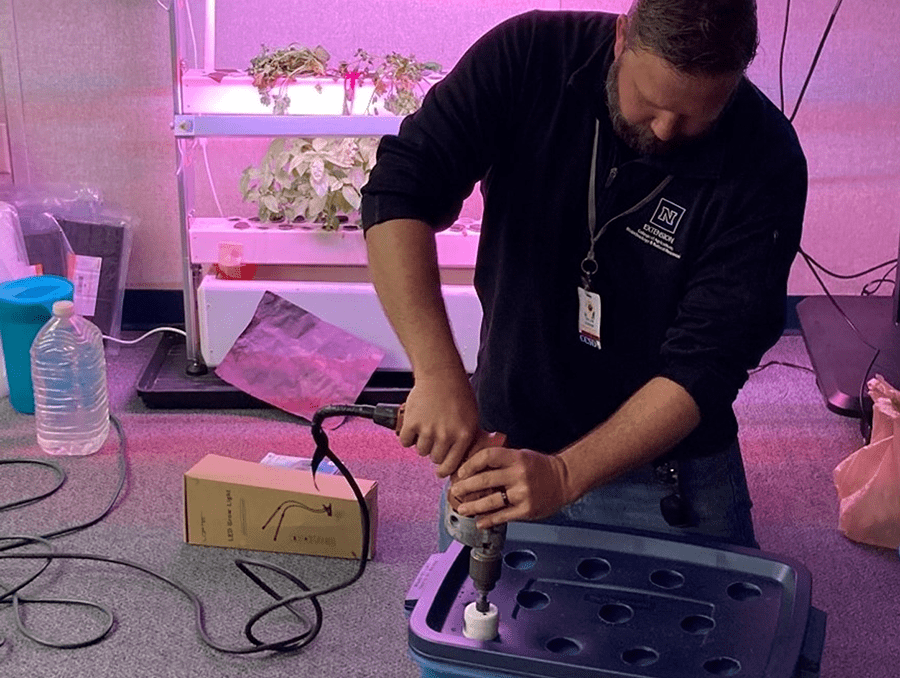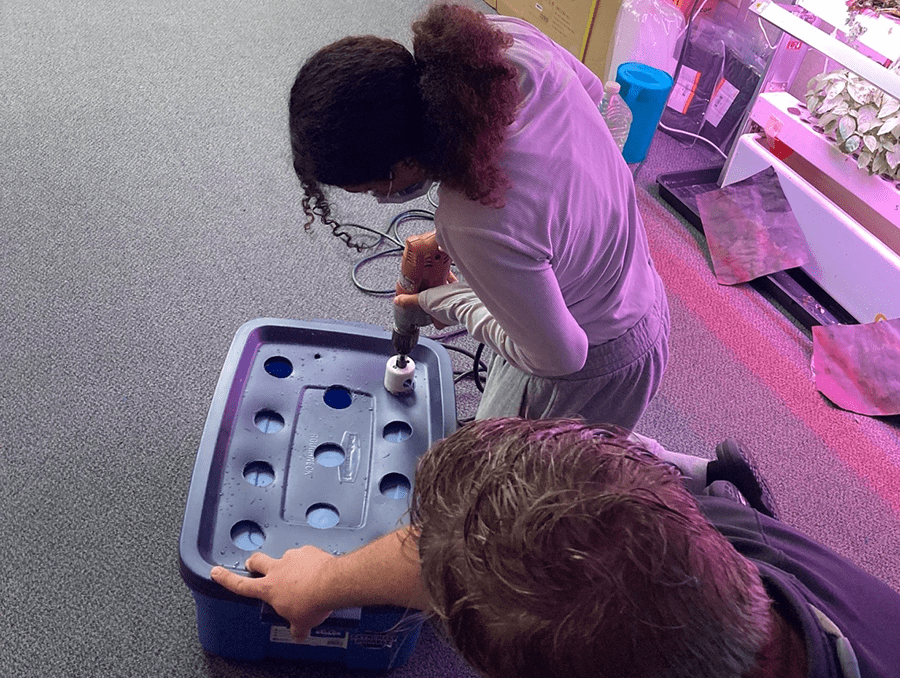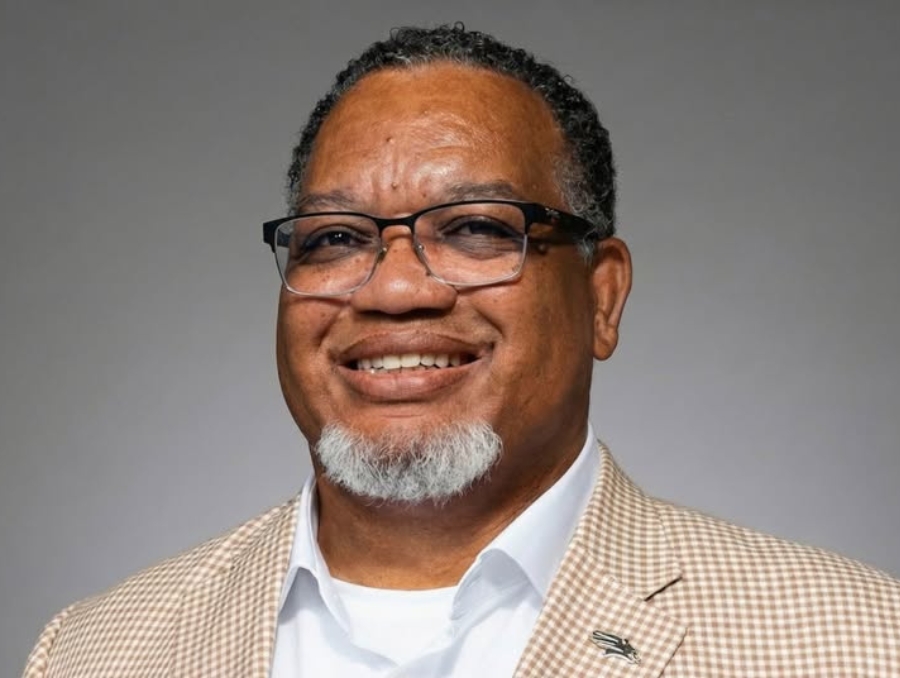A unique program using horticulture combined with mentorship is changing the lives of students through a program called “Young Men Mentorship through Hip Hop, Literacy & Horticulture,” created in partnership between University of Nevada, Reno Extension and law enforcement in Clark County. After successfully launching a pilot program using this new curriculum at Western High School with Las Vegas Metropolitan Police Department in 2022, Extension continued to work with law enforcement in North Las Vegas to create a culture of change at Legacy High School in the 2022-2023 school year with the program. The program will soon be making its way into more Clark County schools, as more law enforcement programs and Extension seek to benefit students in additional high schools.
Program roots
This 12-week program aimed at gang intervention and curtailing violence in schools was created by Extension Youth Horticulture Education Program Officer Tricia Braxton Perry and Las Vegas Metropolitan Police Officer Arnold Parker, who worked together to develop the curriculum. The two were introduced by Olivia Smith, who previously served as community outreach manager at Nevada Anthem Blue Cross Blue Shield Medicaid Division and is now director of community engagement for the police department’s foundation. Anthem provided a grant that funded the hydroponic equipment at The Harbor Sites Juvenile Assessment Centers where Extension’s Youth Horticulture Education Program was setting up hydroponics units as part of its work with the “diversion” program. Diversion programs are intervention approaches that redirect youths away from formal processing in the juvenile justice system, while still holding them accountable for their actions.
Smith saw the value of what Perry was trying to accomplish at The Harbor and connected Perry with Parker. Perry said they knew they wanted to work together on a program aimed at youth and improving communities; they just needed to figure out how. Perry is familiar with law enforcement community work since she is a retired New York City police officer who worked with youth projects while assigned to patrol.
“Three people had an idea to impact lives in a way that was meaningful, and help students identify careers they may not have identified with,” Perry said, as she described the program’s beginnings.
As they partnered to develop a curriculum, Perry and Parker created a program that explores the themes of self-identity, group identity, leadership skills, community leadership, and college and career preparation aligned with academic content standards. The pilot program at Western High School was made possible through the support of former Assistant Principal Malena Baizan, who also worked with Parker on the mentorship portion of the curriculum.
Extension is tasked with providing the horticulture education and career readiness portion of the curriculum, while law enforcement provides the mentorship component. Through the partnership with law enforcement, students can develop positive relationships with police officers as the students embark on their journey of self-discovery and self-development as leaders among peer groups and communities.
Program participation
Participating students are usually referred to the program by school counselors who think students may benefit. This might include students who struggle with truancy, academics or behavior, but sometimes it’s through word of mouth from their peers. Parker said that they conduct interviews with students to let them know what they are joining, and make sure they understand what they’re getting into and that it’s a good fit. They work to identify students they think can make a positive difference in the school once they complete the program. Parker said he sees the students who participate as influencers.
“We want to work with a diverse group of kids, but we’re not talking about diversity as far as color,” Parker said. “We’re trying to prevent violence in schools, and we want to elevate students, but we know who we want to elevate. We might get that truancy kid, behavioral kid or kids who are struggling academically. But we tell the schools that we want a diverse group that includes leaders. I don’t care if you're a gang leader, or if you’re captain on the football team, basketball team or sports team, or an academic. We want every type of kid in that classroom because what we learned is when we bring them all into the classroom, they all have a lot of similarities because we are at high-risk schools. The kids aren’t high risk, it’s the environment they’re in.”
How the program works
The selected students attend the class during their normal school day, rather than after school when participation or attendance may be a challenge. Rather than a traditional classroom, the rooms are furnished with couches and bean bags to create a less institutional atmosphere, one that will draw students in.
Throughout the program, the focus of the curriculum alternates weekly between mentorship and horticulture education.
It starts with mentorship weeks, during which the officer shares a poem or a music video that is related to that week’s topic. This serves as a catalyst for discussion amongst the students and their mentor. These dialogues provide opportunities for the students to connect with each other by sharing their experiences, while officers share a bit about their life experiences.
“It’s when you are able to talk about real-life experiences that you are able to engage as human beings, and that connection is so valuable,” Perry said.
The program size is kept small intentionally to allow for more meaningful connections.
“We keep it at just under 20 [students],” Parker said. “I don't know if it would be effective if we had 50 kids. It's vulnerable conversations, and for that, it needs to be smaller.”
In the following week, Extension instructors teach plant science using hydroponics, which is a soil-less technique used to grow plants. These activities serve as practice for students to develop 21st century skills needed to succeed in the world, such as problem-solving, leadership, collaboration, communication and observational skills. At the same time, they’re learning all about how to take care of a plant and what its needs are.
“The topic of the mentorship week may be about teamwork. The following week the hydroponic project will rely on teamwork to troubleshoot potential equipment problems with the hydroponic unit,” Perry said. “The complexities of hydroponics calls for knowing about troubleshooting strategies. They take the whole process of taking care of plants, which can then be related to taking care of other aspects of their lives.”
The goals
The program has multiple goals. In addition to changing culture, the program also aims to open students up to new opportunities and equip young men with the tools they need to lead happy lives and succeed in the world through self-determination, self-empowerment and perseverance as they follow their chosen paths.
“We really want these kids to see that there are opportunities for them to learn about different careers,” Perry said. “We have to make sure that our kids in Nevada see themselves in the key job sectors for the future. Agriculture is a key sector that is growing in our state. These kids are now considering jobs in agriculture.”
Connections
Culture changes are being seen from the students’ participation and the relationships they are building with each other.
“We’re creating a safe haven for these kids who might not otherwise have interacted to connect,” Parker said. “Now our groups come together. They’re going to say ‘that's my friend’ now. And by making that connection, we’re coaching them to reduce violence between groups.”
Participation in the program is having a positive impact on the lives of the students.
“They are making better decisions,” Parker said. “For some kids who weren’t showing up to school, they were making the decision to come. And that means from 7:00 to 3:00, they were not on the streets. They were on campus.”

Taylor Quiram is an Extension community-based instructor who teaches hydroponics at Legacy High School. He said that the kids just seeing adults make a commitment to them, just showing up and offering this experience, is changing the students.
“I've heard the kids make comments that they notice who's showing up,” Quiram said. “They respect that the person is loyal and they're always here. So, kids saying that about the instructors makes them want to show up and be part of this.”
Perry echoed this sentiment.
“At first, some of the students are skeptical about working with law enforcement and University staff,” Perry said. “But these kids know what it looks like when someone shows up for a legitimate reason.”
The future
Perry is looking forward to expanding the reach of this program. She is actively working with Parker, Smith and other law enforcement agencies and schools to see how the program can further be implemented.
For more information, contact Perry.
















